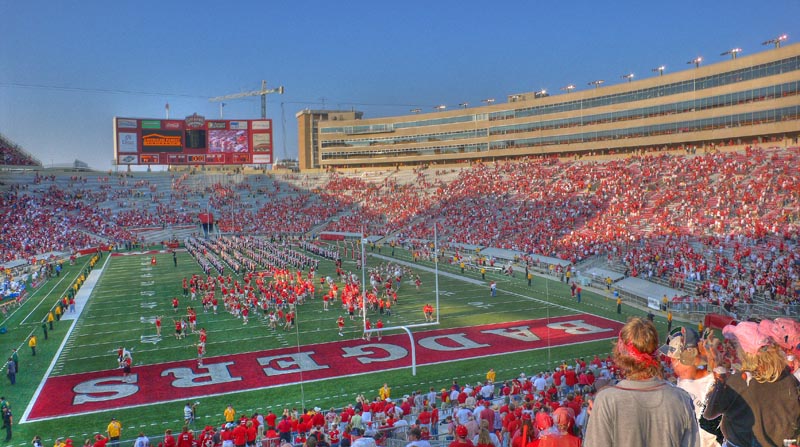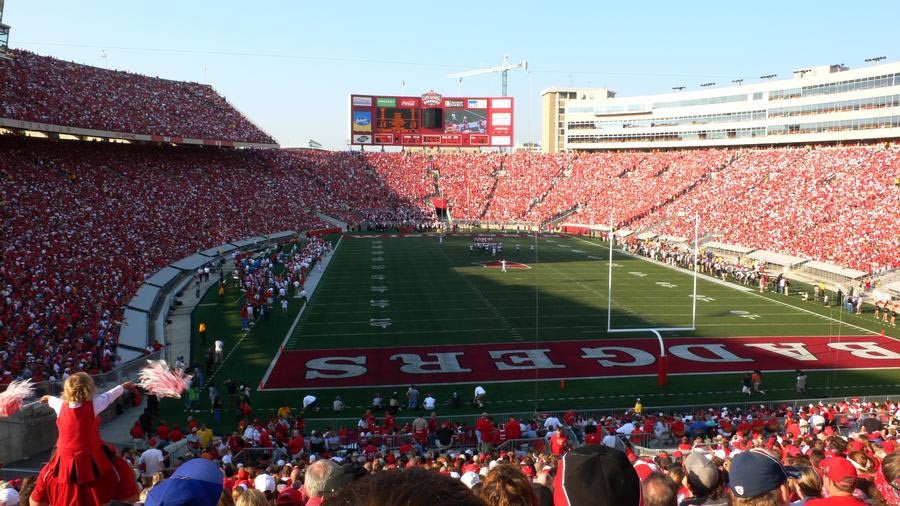
The Badgers shut out San Diego State: 14-0.

Many more photos here.
Queueing up for a flight through Chicago recently, I stood behind three well dressed Bear fans. It was a rather long queue – about 30 minutes. The fans reveled in last Sunday’s shutout and hatched plans to obtain tickets, flights and lodging for February 4, 2007 in Miami – site of the 2007 Super Bowl.
Hubris.
Perhaps premature….. They also mentioned that the Bears were the last team to shut out the Packers in 1991….
For many, Sundays are now wide open. One wonders if the Pack will fall to the depths of the Bart Starr and Forrest Gregg era?
Interesting spin on this vote:
We are blowing away the fog of anonymity,” said Rep. David Dreier (R-Calif.), chairman of the House Rules Committee. “The goal is to pull back the curtain on earmarks to the public.”
The rule change shelves a wider ethics bill, however, at least until next year. That bill became bogged down amid disagreements between the House and the Senate, and the reluctance of lawmakers from both parties to limit their interactions with lobbyists. The earmarks measure was brought up as a passable way to address voter unrest over the scandals, aides said.
“This bill represents the death of lobby reform,” said Rep. David R. Obey (D-Wis.), a former chairman of the House Appropriations Committee.
Madison’s representative Tammy Baldwin voted No. Obey’s comments are ironic, given his prolific use of earmarks. Lots more on earmarks here.
I don’t think there’s much to be proud of from either party’s perspective. Applying some “sunshine” to the earmark process is a good thing.
Opening a new front in its battle with cable companies for the country’s Internet, telephone and television customers, AT&T Inc. on Tuesday started selling Web-based TV service.
For $19.99 a month, the telecommunications firm is offering about 20 channels over the Internet, with the promise of more soon. The service is available to anyone with a high-speed, or broadband, Internet connection – wired or wireless.
The rollout is “an example of how we’re trying to evolve into an entertainment company,” said Sarah Silva, Milwaukee-area spokeswoman for AT&T.
A case in point is the HHS-Education spending bill, which so far contains 1,867 earmarks at a cost of just under $500 million. Members tell us the bill has caused a mini-rebellion because two of the three largest earmarkers are Democrat Nancy Pelosi, who walks away with $7.9 million worth of goodies, and David Obey, the ranking Democrat on Appropriations who receives $6.8 million for his Wisconsin district. This is the same Ms. Pelosi who earlier this session pledged to give up her pork to help balance the budget.
The House GOP leadership finally seems to comprehend the stakes in this pre-election budget fight. Majority Leader John Boehner calls the anti-earmarking bill “must-pass legislation,” and has agreed to separate it from a bottled-up lobbying-reform bill. All that can block this from passing now are the spend-happy Republicans on Appropriations. If they succeed, they will have inflicted a far greater wound on their majority than the Democrats ever could.
I’ve not heard back from Tammy Baldwin regarding her views on earmarks [see “Spreading the Love“].
Robert Reich says earmarks must go:
The number of registered lobbyists in Washington has ballooned to the point there are over 60 of them for every single member of Congress. And they spent $2.4 billion last year. What do you think the lobbyists bought with that money?
A lot of it’s called “earmarks” — special spending that’s stuck into pieces of legislation to benefit particular constituents, like that Alaskan bridge to nowhere in last year’s highway bill, and the special casino licenses that got lobbyist Jack Abramoff into trouble.
Ten years ago there were about 3,000 earmarks. Last year there were over 14,000, costing taxpayers over $47 billion according to the Congressional Research Service.
Last January, after the Jack Abramoff scandal had spread to staffers of former House Whip Tom DeLay and Ohio Republican Bob Ney, and after FBI agents found an unexplained $90,000 cash in the freezer of Louisiana Democrat William Jefferson, and after former California Republican Duke Cunningham pleaded guilty to bribery — after all that — it seemed like the House was so embarrassed it would clean itself up. At least that’s what Speaker Dennis Hastert promised.
Kevin Marks raises some great issues in his review of Apple’s iTV announcement:
Reading Paul Boutin’s coverage of Apple’s video announcements today, There are several questions that come to mind (and I know Jobs prefers not to answer questions).
[..]
In other words, will it play HD content made by independents cleanly, or will it require broadcast flag handshakes?
Facebook implemented a new feature called "News Feeds" that displays every action you take on the site to your friends. You see who added who, who commented where, who removed their relationship status, who joined what group, etc. This is on your front page when you login to Facebook. This upset many Facebook members who responded with outrage. Groups emerged out of protest. Students Against Facebook News Feeds is the largest with over 700,000 members. Facebook issued various press statements that nothing was going to change. On September 5, Mark Zuckerberg (the founder) told everyone to calm down. They didn’t. On September 8, he apologized and offered privacy options as an olive branch. Zuckerberg invited everyone to join him live on the Free Flow of Information on the Internet group where hundreds of messages wizzed by in the hour making it hard to follow any thread; the goal was for Facebook to explain its decision. In short, they explained that this is to help people keep tabs on their friends but only their friends and all of this information is public anyhow.
I don’t know where to start. This primary today is the third election that I have worked as an election judge. The last two elections were in 2004, and I was in a small precinct in Timonium, MD. This time, I was in my home precinct about 1/2 a mile from my house. We had 12 machines, over 1,000 voters and 16 judges. I woke up at 5:30 in the morning and was at the precinct before 6:00. It is now 10:18 pm, and I just got home a few minutes ago. As I have made it my custom, I sat down right away to write about my experience while everything was still fresh. In anticipation of this, I took some careful notes throughout the day.
The biggest change over the 2004 election was the introduction of electronic poll books that we used to check in voters. I was introduced to these in election judge training a few weeks ago. These are basically little touchscreen computers that are connected to an Ethernet hub. They each contain a full database of the registered voters in the county, and information about whether or not each voter has already voted, in addition to all of the voter registration information. The system is designed so that the machines constantly sync with each other so that if a voter signs in on one of them and then goes to another one, that voter will already be flagged as having voted. That was the theory anyway. These poll books turned out to be a disaster, but more on that later.
Madison could use more poll workers. Contact the City Clerk for more information.
I listen to 91.7 (www.wsum.org streaming online) periodically, including yesterday – catching a pleasant Massive Attack piece.. Their musical depth and breadth continues to impress – in what is largely a sea of sameness, playing the Police and others over and over and over.
Three recent and often rare examples of reporters asking incisive questions:
What happens if Koren Robinson kills somebody in Wisconsin driving drunk or fleeing the police?
Green Bay Packers general manager Ted Thompson wore a smile late Monday afternoon as he prepared to meet the media in the Lambeau Field atrium to announce the signing of wide receiver and kick returner Koren Robinson. When that was the first question fired at Thompson following his brief introductory remarks, he turned ashen and somber as he tried to collect himself and provide an answer.
“Oh, I can’t answer anything like that,” Thompson said after a two-second pause. “There’s issues in his past that obviously he’s made some mistakes, but most of those issues are covered under the confidentiality of the NFL and the NFLPA. There’s programs set up and that sort of thing, and that’s where that lies.”
More on Robinson
I only asked because no one else did. When Kathleen Falk announced her candidacy for attorney general against fellow Democrat Peg Lautenschlager at the City-County Building on Monday, I thought it would be one of first things that came up. But while several reporters quizzed Falk about Lautenschlager’s 2004 arrest for drunk driving (Falk deftly evaded the question, saying voters would have to reach their own conclusions), none asked her directly about her own record in this area. And so I raised my hand, waited until Falk called on me, and popped the question.
Whether or not Falk choose to make an issue of it, I prefaced, the key reason Lautenschlager was seen as vulnerable was this drunk driving arrest, even though this is conduct that most people in Wisconsin have engaged in. And so I asked Falk point-blank: “Can you say whether you have ever in your life gotten behind the wheel of an automobile after consuming alcohol? Have you never done that yourself?”
The State Journal points to studies that suggest its readership is at sky-high levels. “The numbers for Capital Newspapers are absolutely stellar,” boasts an internal memo from the company’s marketing director, Jon Friesch. “In Dane County, 83% of adults read the Sunday Wisconsin State Journal, and 79% read the daily or Saturday edition of The Capital Times or Wisconsin State Journal.”
But while these numbers come from an independent company, Scarborough Research, they may be misleading, since they include even casual readers. The 83% number, clarifies Friesch, measures respondents who have read the Sunday paper “in the last month”; the 79% number is respondents who have read either of the two dailies “in the past five days.”